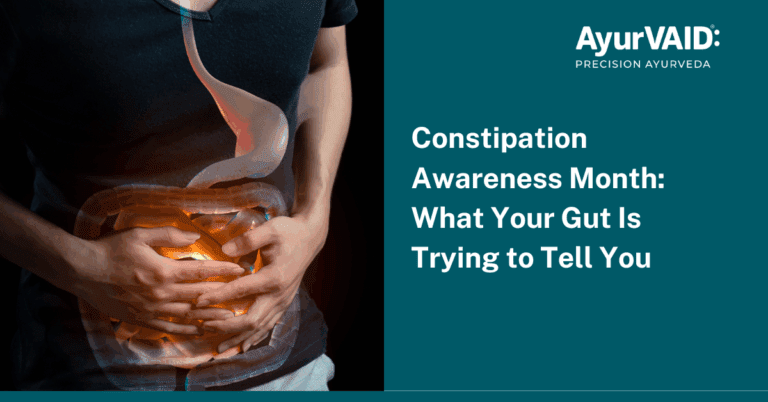Sleep is one of the body’s deepest medicines. When it becomes irregular or insufficient, our digestion, immunity, mood, and clarity falter. If you have asked what is insomnia, the simple, patient-friendly answer is: it is repeated difficulty falling asleep, staying asleep, or waking unrefreshed, despite having adequate time and opportunity to sleep, and it causes daytime problems such as fatigue, poor concentration and emotional distress.
Modern medicine classifies sleep disorder types by duration (transient, acute, chronic) and by cause (primary versus secondary), which guides measurement and evidence-based therapies. Ayurveda addresses the inner imbalance—why the mind and body fail to settle—and offers a personalised path to restore rhythm. In this blog, let’s discuss what are the most common causes of sleep problems and all about insomnia as per Ayurveda.
What is insomnia?
Ayurveda frames sleep (Nidra) as one of the three pillars of life (Trayopastambha). Healthy sleep arises when grounding, cooling, stable qualities (primarily Kapha and Tamoguna) support the mind and tissues. When lighter, mobile Vata or hot, agitated Pitta predominate, or when digestion (Agni) is weak and toxins (Ama) accumulate, Nidranasha (insomnia) follows. Classical texts highlight emotional stress (Manasika hetu), trauma, improper diet, and irregular routine as causes of disturbed sleep.

Causes of Insomnia
When people ask what are the most common causes of sleep problems, clinically the list is familiar: stress and anxiety, mood disorders, chronic pain, medical illnesses, medications and substances (including caffeine and alcohol), shift work or circadian disruption, and primary sleep disorders such as obstructive sleep apnoea or restless legs syndrome.
Ayurveda reframes these through lifestyle and dosha language: late, heavy, or spicy meals aggravate Pitta; irregular schedules and excessive activity provoke Vata; and daytime overrest or sluggish digestion increase Kapha—all of which create an internal environment unfavourable to restful sleep.
Insomnia - Types
Types of insomnia are usefully described both by symptoms and dosha. Symptomatically, we see sleep-onset insomnia (difficulty initiating sleep), sleep-maintenance insomnia (frequent night awakenings), and early-morning awakening (waking too early and being unable to return to sleep). Ayurveda classifies nidranasha as – Vata-type insomnia features a racing mind, light, fragmented sleep, and worry; Pitta-type shows early waking, heat or burning sensations, and irritability; Kapha-type presents as heavy, non-restorative sleep and daytime sluggishness. Mixed patterns and insomnia due to weakness (Kshaya) or toxins (Ama) are also recognised, which is why Ayurveda assessments are highly individualised.
Symptoms extend beyond daytime tiredness. Chronic, poorly restorative sleep erodes mood stability, cognitive sharpness, immune resilience and quality of life. In Ayurveda terms, prolonged Nidranasha disturbs tissue nourishment (Dhatus) and mental balance (Manas), increasing vulnerability to metabolic and emotional disorders. This is why early, compassionate attention to sleep often prevents systemic imbalance.
Ayurveda’s Approach
Ayurveda treatment is naturally individualised and has many layers. The first layer is Dinacharya, or daily routine, because rhythm trains the circadian system and calms Vata. The practical advice is to have regular wake and sleep times, have the last meal with light digestion in the early evening, avoid caffeine at night, and use some gentle ritual before bed as a signal to the nervous system for sleep. These approaches overlap with principles of modern sleep hygiene; however, they fit into a larger life philosophy, which respects constitution (Prakriti) and the current state of imbalance.
Mind-calming practices (Manasika chikitsa) are central. Warm sesame oil self-massage (Abhyanga), gentle neck and scalp massage, and short breathing exercises or guided relaxation reduce hyperarousal and soothe Vata. Nasya (nasal oil), when appropriate and given by a trained practitioner, can help calm the mind and upper channels. Simple contemplative practices, gratitude or journaling for five minutes before bed often reduce the rumination that perpetuates sleeplessness.
Herbal support is selected to match the dominant dosha and symptom pattern. Classical herbs are used in combinations to calm the nervous system, support resilience and improve sleep architecture. Contemporary clinical reports and trials on certain Ayurveda formulations show favourable changes in sleep measures and anxiety indices—encouraging evidence for cautious, evidence-informed use along with lifestyle modification.
External therapies such as Shirodhara (a gentle, warm oil flow on the forehead), Abhyanga, and mild Svedana (steam) have been observed to improve sleep quality and lower physiological arousal in case series and small studies. These therapies likely act by shifting the autonomic tone towards parasympathetic rest-and-digest states and are most effective when integrated into a personalised plan that also addresses digestion, routines, and psychology.
For chronic insomnia, Ayurveda addresses root habitual causes — diet, daily rhythm, restorative rituals and dosha balance — and by providing supportive therapies that reduce physiological arousal. For many people, a comprehensive approach is the most compassionate and sustainable route to long-term recovery.
Practical, kind steps you can begin tonight: set a consistent bedtime and wake time, avoid caffeine after mid-afternoon, take a light earlier dinner, write down worries for five minutes to clear the mind, try a brief warm oil massage or warm bath, and practise slow diaphragmatic breathing for five to ten minutes. Keep a simple sleep diary for a week — patterns often reveal changeable triggers such as late meals, evening screens or naps. Seek assessment if you snore loudly, have excessive daytime sleepiness, mood changes, or persistent sleep loss— these can indicate conditions that benefit from specific medical or sleep specialist care.
In summary, insomnia is common but treatable. Understanding what insomnia is from both modern and Ayurveda perspectives helps us not only ease symptoms but also address root causes. Recognising sleep disorder types and identifying the most common causes of sleep problems in your daily life—stress, digestion, routines, or an undiagnosed medical issue— is the first step toward gentle, lasting recovery. With a personalised routine, mind-calming practices, appropriate herbal and external support, and, when needed, targeted behaviour therapy, healthy sleep can be restored.






